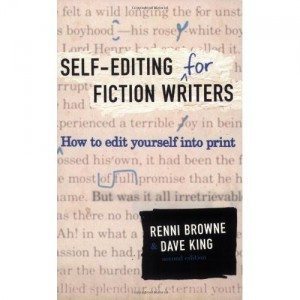I have a Bachelor of Science Degree with a double major in Journalism and Creative Writing. When I graduated, I decided I wasn’t really interested in continuing to a Masters. I was exhausted and felt like I had absorbed all I could over the past 5 years. My plans do not include teaching or taking a “regular job.” I didn’t see the additional degree as necessary or even beneficial. I’m not sure my opinion has changed, but I have discovered that my expensive, exhausting education didn’t cover everything that I need to know about writing fiction.
The writers group that I became involved in last April, through a platform building exercise with Writer’s Market editor Robert Brewer on his personal blog, has branched into many forms. One of them is a Reading Group on Goodreads. Because I have been repeatedly told that I must read on a regular basis if I am to write well, I joined the group as soon as it formed. So far, we have been concentrating on books about writing. We started out with Stephen King’s “On Writing” and continued on to Anne Lamott’s “Bird by Bird.” Both books provided interesting insights and tips. I felt empowered because much of what they said rang true with my own experience and opinions.
Then we moved on to our current endeavor, “Self-Editing for Fiction Writers” by Renni Browne and Dave King. I’d never heard of the book or either of the authors so I went into it expecting something on sentence structure, grammar, and maybe advice on revising. The first chapter began to quickly disabuse me of that notion. It took me back to the basic instruction from school to “show not tell” and told me it’s sometimes wrong, that there are times when telling is better and more efficient than too much showing. I wasn’t exactly shocked, but Browne and King proceeded to explain why it’s sometimes better to tell than show. No one had ever done that for me before. I was forced to start revising my own attitudes about how to write.
The second chapter discussed building characters and using exposition effectively. The third dug into Point of View. A lot of this was things that had been covered in my classes, but it always seemed to take a different slant or expand more fully on the “rules” I’d been taught. When I reached the forth chapter, I was stopped cold. Proportion was something I’d never been exposed to before. Sure logic indicates you should spend more time on your primary points and give less attention to minor elements, but I don’t recall a single professor ever bringing it up. Maybe I missed that day or something.
Browne and King say “When you are writing from an intimate point of view, your viewpoint character’s interest at the moment should control the degree of detail you put into your description.”…. “In fact, allowing your viewpoint character’s interest of the moment to control your descriptive detail is another way of writing from an intimate point of view…..you can use this connection to subtly create a sense of who your characters are.”
This is important stuff. It can mean the difference between stick people and fully 3D characters that your reader understands and cares about.
Chapter 5 covered the basic mechanics of dialogue and I was back on familiar ground. Using “said” as your primary dialogue tag was fully covered in class and I felt comfortable again. However, I’m now on chapter six which is discussing the need to make careful word choices for dialogue. Words that fit with the intended characterization. Since the title is “See How It Sounds,” I was prepared for the idea of reading it aloud. I do that with most of what I write anyway. I believe fully in using an attentive ear to catch problems not only with dialogue, but also with exposition. It was the point of choosing the correct word based on how you want your character to be perceived that struck me. I know I sometimes do this, but not usually intentionally. I am realizing that most of the things I am gleaning from this book are about intention.
I have always thought of myself as more a “planner” than a “pantser.” Stephen King’s book had further convinced me of that fact. I did the exercise he recommends at the end of his “On Writing” book. I thought it worked out rather well while doing a short story, but I couldn’t envision doing a whole novel that way. However, what I am finding in “Self-Editing….” makes my current methods seem like pantsing. All the plot summaries, outlines, and character lists with accompanying backgrounds are nothing beside the kind of thoughtful, intentional planning that Renni Browne and Dave King are talking about. Lamott’s “Bird by Bird” touched on this slightly, but even she didn’t dig this deep.
I am once again expanding my mind through study and it feels good, but scary. I never intended to work so hard. I was just going to do some research, make an outline, write my character summaries and start putting the story on paper (Ok, not real paper, but that blank white screen works the same in the long run.). I’m half way through the book. It has already shaken up my attitude and thought process. I am excited because I’m learning new stuff, but kind of nervous too. I’m wondering if I have enough years left to become the kind of writer I want to be.

Comments are closed.